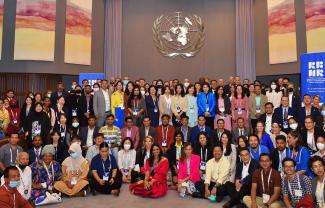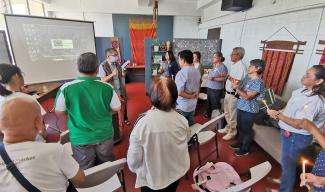The United Nations Guiding Principles on Business and Human Rights is helping strengthen efforts to make businesses accountable for abuses committed in the course of their operations, hopefully transforming them from mere profit-seekers into catalysts of social development.
by Ling Hong
Businesses in the neoliberal era are bringing not only economic development but also detrimental impacts on people and nature. This is heightened by neoliberal policies that promote corporate capture whereby states seemingly take the cudgels for profit-seekers in the process of orchestrating economic development, especially for projects that require massive exploitation of natural resources.
This state of things places at a disadvantaged position indigenous peoples and local communities who largely depend on the health of forests and land for their livelihoods and the preservation of their identity.
To reverse this condition and make businesses accountable for the adverse impact their operations have on people and communities, the mechanism "Business and Human Rights" emerged.
The United Nations Guiding Principles (UNGP) on Business and Human Rights was unanimously endorsed by the United Nations Human Rights Council in June 2011. These guiding principles are drawn from existing standards and practices in international and domestic laws which are re-elaborated for states and businesses.
The principles are grounded on the framework of "Protect, Respect and Remedy" in recognition of the State's duty to protect human rights, the corporate responsibility to respect human rights, and the need for greater access to remedy for victims of business-related abuses (Ruggie, 2012).
Based on the framework, the 31 guiding principles were developed, and states and businesses are encouraged to comply through policy commitments, although on a voluntary basis. Through legislation, a state sets out its expectation for businesses to abide by the guiding principles as well as establish mechanisms for access to justice and remedy for affected communities. Corporate organizations are enjoined to integrate human rights standards into their operations to avoid human rights abuses.
A significant measure to guarantee implementation of the UNGP is for states to develop a National Action Plan (NAP) on business and human rights, upon the strong push of the European Union.
Japan, Thailand experiences
In Asia, Japan and Thailand are recognized as pioneers in adopting NAPs. Thailand’s NAP was adopted by the Cabinet on 29 October 2019, and covers the period 2019 to 2022. It identified as priority themes labor; community, land, natural resources, and the environment; human rights defenders; and cross-border investment and multinational enterprises (NAPBHR, p.65-126).
During the 2022 Asia-Pacific forum on business and human rights on “Translating United Nations Guiding Principles into Practice”, panelists from both countries pointed to the necessity of raising awareness about the guiding principles among businesses and civil society organizations to ensure effective implementation of the NAP. They recognized the key role played by nongovernment groups in such a process. The panelists further observed that the lack of political will of states to impose stronger regulations and require human rights compliance, and the shrinking civic space in Southeast Asian countries are weighing down the implementation of the UNGP in the region.
In Thailand, it was observed that the NAP was ineffective in stemming the widespread human rights abuses by businesses such as the filing of strategic litigations against public participation or SLAPP cases targeting those opposing their operations. The instrument, it was further observed, failed to guarantee access to remedy by affected communities and peoples.
Even then, some positive lessons are also noted from the experience of Thailand. For one, its Ministry of Justice is at the core of rolling out the NAP, taking the cudgels for the instrument with other government ministries, conducting trainings, organizing exhibitions, interacting with the news media, and creating the Business and Human Rights Academy, all in the interest of advancing the cause of business compliance to the UNGP. Moreover, the ministry already identified 10 areas, including provincial ones, where it will pilot on-the-ground NAP implementation.
In Japan, the government has estimated that about 50% of companies have started complying with the UNGP. However, effective implementation is put into question since the instrument is a voluntary one, not legally binding. During the forum, many participants, including those among the panelists, view the development as an encouraging one, saying the NAP is a starting step for implanting the UNGP into the mindset of businesses. Although, everybody agreed that the situation could have been better if the guidelines were translated into legally binding instruments through a national law.
State of human rights defenders
Another critical topic tackled in the forum is on human rights defenders, encompassing those working for the protection of the environment and indigenous peoples. The UN organizations and human rights lobbies acknowledged them as "ears and voices" of the human rights situation on the ground as well as frontline actors who risk their lives for sustainable development by fighting to protect communities against harmful businesses.
However, in many countries around the world, human rights defenders are tagged "anti-development actors,” and even terrorists as their work are criminalized, making them vulnerable to legal attacks.
According to the Business & Human Rights Resource Center, there were 600 attacks in 2021 on climate, land, and environmental rights defenders worldwide, and there are no signs of letup. At least 76 were killed while defending their rights against harmful business operations and at least 88 death threats and intimidation were recorded.
Judicial harassment, including SLAPP cases, was the most common type of attack against human rights defenders in 2021. Last year, most of the attacks occurred in India (49), Mexico (47), and the Philippines (44).
Many of the forum participants who are from civil society organizations and human rights defenders, shared their experiences with judicial harassment, SLAPP cases, arbitrary arrests, imprisonments, killings of colleagues, and threats associated with their work of defending grassroots communities and peoples against harmful business operations. These experiences demonstrate the feeble condition of existing protection mechanisms for human rights defenders——in the same way that mechanisms of justice for affected peoples and communities are also weak—— in the countries of the region.
Alarmed by this trend, forum participants are one in recognizing that the protection of human rights defenders must be a priority in the implementation of the UNGP and in pursuing sustainable development in the region as they play a crucial role in efforts to minimize the negative social, environmental, and livelihood effects of business activities.
During the forum, leaders of indigenous peoples from Indonesia, the Philippines, Thailand, Northeast India, Bangladesh, and Nepal voiced their concerns about the failure of state authorities to check on the complicity of businesses in acts of human rights abuses as they force their way into local communities and indigenous territories with wanton disregard for Free and Prior Informed Consent (FPIC) rules amid worries these ventures bring dire impacts on the environment and peoples. These investments include, among others, the construction of dams, mining, and conservation. It was just unfortunate that representatives from international financial institutions that usually bankroll these projects were not around, and there were also only a few representatives of governments present. In relation to dams, some activists participating in the forum openly rejected suggestions that mega dam ventures, which incur widespread social and environmental footprints, should be considered as renewable energy initiatives.
There is still a big challenge in turning around the regard of businesses and governments toward human rights defenders and the pivotal work that they do for social development. Hence, states, UN agencies, human rights-based institutions and nongovernment groups must think of ways to provide them protection. Governments should, at the very least, lift policies that criminalize the work of human rights defenders.
Aspiring for more teeth
One of the initiatives along with UNGP is the advocacy for Legally Binding Instruments (LBI) led by Asia Task Force. Asian countries such as China, India, Indonesia, Pakistan, the Philippines, and Vietnam voted in favor of this instrument at the Human Rights Council (Resolution/26/9/27 June 2014).
Ecuador was the lead country in advocating for LBI, rooted on their experience with the tremendous negative impact of the oil production activities of Chevron for which the American multinational got away with accountability.
Asia Task Force, which was established in 2017 for LBI advocacy, was actively engaged in the forum’s space for civil society organizations (CSOs) in pursuit of a draft legally binding international human rights instrument or treaty that could help end corporate capture of state decision making pertaining to human rights issues that involve businesses hence, ensure a stop to abuses and violations on the local environment and peoples arising from business operations. Such instrument also intends to establish access to justice by individuals and communities facing business-related abuses and violations——such as land confiscation, risking lives, destruction of natural resources, and the perpetration of slave-like working conditions (ESCR-Net)——as a response to the limits of the voluntary nature of the UNGP.
In drafting a legally binding treaty, there should be active participation of communities, CSOs, and like-minded state actors and businesses. Central to that process should be the interests and needs of indigenous peoples, local communities, and human rights defenders.
In the forum’s free space for CSOs, apprehensions were raised that going into the LBI negotiation process, CSOs may be handicapped by their poor knowledge of the UNGP. There were also worries the LBI negotiation may become a largely state-led process and sweep civil society voices in the margins, and that the resulting instrument may veer away from the original purposes of the UNGP.
To make the LBI advocacy effective, it was recommended that an assessment must be done on NAP implementation, highlighting its gaps and limits, and the active engagement of CSOs, human rights defenders, and communities in each country.
More work needed
In conclusion, UNGP and NAP are already a good start for ensuring the protection of communities and peoples against potential human rights abuses arising from business operations, and providing those negatively impacted access to remedy and justice.
However, despite UNGP and NAP, human rights abuses traced to businesses are still widespread and increasing, and those working to defend the rights of communities and peoples against these are the subject of attacks.
More work, therefore, is needed to make businesses comply with the UNGP as well as embed the UNGP into how countries regulate economic activities and pursue social development.
In the meantime, the bleeding among the community of human rights defenders must immediately stop.
(Ling Hong is the Lower Mekong Officer of Samdhana Institute. Ling attended the 2022 United Nations Responsible Business and Human Rights Forum, Asia-Pacific, from 19 to 22 September 2022 in Bangkok, Thailand. This article is a reflection piece and does not represent the official position of Samdhana Institute. )




